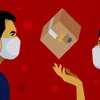The silver lining behind the COVID-19 cloud
The threats emanating from the outbreak of COVID-19 will soon recede, but it has taught us many lessons. Hopefully, we continue to question existing paradigms and move ahead in the right direction.
The term 'Black Swan' was popularised and made mainstream by Nassem Taleb. Black swan is a totally unanticipated event that could decimate families and businesses, and bring whole nations to their knees. The credit crisis of 2008 was a black swan event of sorts but was still man-made and hence not totally out of bounds of 'predictability'. In fact by warning of a bubble, Raghuram Rajan built his reputation of being one of the few contrarian and sane voices during the euphoria preceding the crisis.

The COVID-19 outbreak is a paradigm shift altogether for the simple reason that this is not man made. Humanity is as likely to face extinction from a super-volcano or an asteroid hit as from a pandemic. The probability of any of these is low but it exists. The ability to survive any of these black swan events hinges on humanity's ability to react swiftly but thoughtfully.
Social media and mobile have enabled communication and commerce at an unprecedented level and given a new meaning to convenience and comfort. The other side of this coin is that misinformation and panic surrounding coronavirus can spread equally quickly. Artificial intelligence (AI) startups that are built around detecting and filtering misinformation are being challenged and tested by unprecedented events like this. I would like to believe that in the ultimate analysis, momentum would gather around sane voices, and responses would be more thoughtful.
Businesses that relied on a physical assembly of customers under a common roof are the worst hit. Physical retail and restaurant businesses are examples. Since travel directly assists in the spread of coronavirus, the already struggling airline industry is under further attack. Governments are coming up with new advisories on almost a daily basis and each new advisory is impacting one or the other businesses. Businesses are learning to cope with the impact of COVID-19 on the fly.
The coronavirus has also forced individuals, families and businesses to revisit several assumptions and paradigms. The assumption that a lot of work could be best performed by assembling people under one roof after an arduous commute through heavy traffic is now being questioned.
Maybe, we don’t need to solve the problem of urban commute by putting more cars and buses on the road but may just need to revisit the mindset about how work is performed.
The belief that education is best imparted by assembling students under one roof is still strong though remote learning and online learning are making inroads. It is therefore time to think if societies need to pour huge amounts of money into buildings and other infrastructure for education.
And, on top of all this are the standard panic reactions that have become an integral part of any global crisis. There is a flight of capital from emerging economies to the US. Financial assets are liquidated to buy that one asset that everyone believes is safer than the rest, namely the US dollar. Stock markets collapse. All decisions are put on hold under a ‘wait and watch’ guideline. Therefore, decisions on funding, investment, buying are all put on hold. The world economy is getting complex by the day and is always under some form of disequilibrium. It just needs a trigger for the pack of cards to collapse. It doesn't matter what the trigger is.
But there is clearly a silver lining to this dark cloud. And the silver lining is that social distancing can completely contain and halt the spread of the virus. Evidence from authoritative sources is pointing to a nearly forty fold drop in the rate of spread of the virus by just curbing social interaction by just 50 percent. If this is indeed the case, things should turn around for the good within 30 days.
At Bigbasket, we have seen a 2x growth in business and a 15-20 percent increase in the average basket value. While this may appear to be a matter of envy great for an outsider, these are not the kind of spikes that are good for anyone, not even for us. The first few days of the spike created some disruptions in the supply chain, because the business was built for a steady demand with a small month on month growth.
While we ensured that customers are not impacted by the temporary disruptions we faced, we have also taken steps to do all the right things that address the issues of health and hygiene for our staff and customers. We too hope, like everyone else, that things come back to normal quickly and it is business as usual again.
In conclusion, my opinion is that the threats emanating from the outbreak of COVID-19 will soon recede, but it has taught us many lessons. The world suddenly seems to be a lot quieter. People are spending more time with friends and family and many of them are discovering that they are after all nice people. People are figuring out that travel is not as necessary as it may seem. Universities can be online. People can work from home more often and beat traffic, and in the process reduce traffic on the roads. We don’t need more roads. We don’t need bigger cities. We need more cities that are small. Hopefully, we continue to question existing paradigms and move ahead in the right direction.
(Edited by Evelyn Ratnakumar)
(Disclaimer: The views and opinions expressed in this article are those of the author and do not necessarily reflect the views of YourStory.)








